
Book Title: Invictus
Author: Ryan Graudin
Date Started: September 26th 2017
Date Completed: September 29th 2017
Genres: Sci-Fi, Historical, Romance
Quality Rating: Three Stars
Enjoyment Rating: Five Star
Quality Rating: Three Stars
Enjoyment Rating: Five Star
Final Rating: Four stars
Review:
◆ Thanks to NetGalley for this ebook for review ◆
Invictus was a lot of fun. You can tell Ryan loved writing it between her darker books because the spirit of it just lifts from the page. I've yet to read one of her books that I haven't really enjoyed. Her work varies in maturity and genre but every time it's a joy to read.
If you're a history nerd, you'll enjoy this book. Not necessarily for its accuracy (though it could've been much worse - there weren't any specific examples where I was screaming 'that's not what it was like'), but for the various little references scattered through. I'm sure there were some I didn't get as modern history is so much my thing, but the ancient history and renaissance eras were enjoyable just for the little jokes thrown in. (I'd also like to mention how nice it is to have a time travelling story set in the future that doesn't have to go to our present for a cheap 'oh look it's us' gimmick.)
Thank you universe for giving me a stand-alone YA book that wraps up its story. It's such a breath of fresh air to have a book that doesn't have to extend into a series to finish its plot. It's ridiculous how hard it is to find them these days that its a selling point on its own for me. And Invictus proves the point that you don't have to make your story into a franchise for it to be compelling and enjoyable. Yes, the story started to crumble a little bit in believability towards the end, but it's a time travelling book, how can it not? This novel has a well-paced, self-contained story that you can get properly invested in because you know what you're signing up for. I really hope YA publishers start noticing that stand-alone books are just as valuable as series and start to bring them back.
Like a lot of my favourite authors, what Ryan specialises in is people. Well, people and her worlds; she often has futuristic twists on various eras in our world, but in a way that they end up feeling new and unique. With Invictus, that side of the coin is already solved with the time travelling aspect, but the characters are their own element. What pushes this story at times when it might otherwise drag is the dynamics between the crew members and their ability to be believable but still young and, at times, irresponsible and wild. They're not exactly rebels (you're not fooling anyone, Far) but they're young people free to jump around history. Their likeability pushes what is a story that becomes a bit silly at times, but you can buy into it because it suits the characters and fits into its own canon. The worst thing a book can do is misunderstand what it is and take itself too seriously or not seriously enough. Invictus strikes a good balance between the two.
I'm generally not the biggest fan of sci-fi or time travel in books, but Invictus was still great fun for me. The whole crew-relationships and crime-heist thievery with a futuristic twist is always a winner. People are comparing it to Firefly, and while I politely say that it can't touch Firefly's genius, add a little dash of Star Trek, Roman Mysteries and Back to the Future and you get pretty close.


